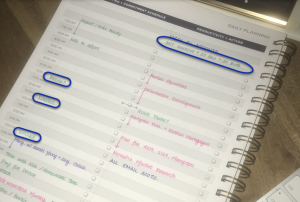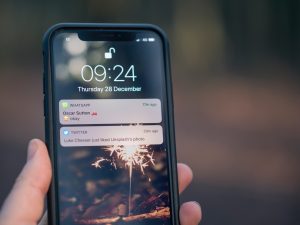How to Reduce Your Stress with 7 Quick Tips

In our busy world we often hear our clients tell us that they are “too busy” for planning, organizing, taking care of themselves, and more. When we ask them, “Then what do you have time for?”, they often rattle off a lie telling us that they only truly have time for work, some interaction with family and friends, and nothing else. But, when we dig deeper, we always find that there’s far more to their story.
What most people are spending their time on are wholly unproductive tasks: surfing the web, looking at social media (repeatedly or for hours on end), watching television, texting, and so on. When they tell us they are both busy and stressed, the problem becomes clear: they are so busy being unproductive, that they don’t actually have time to be productive.

Dr. Shalini Varma, Board Certified Psychiatrist
Dr. Shalini Varma MD, Board Certified Psychiatrist, says: “Everyone has the same amount of time in a day. With fewer productive hours in a day due to lost time, people cannot cram in all the work they want to do and do it well. This starts with aware-apy, or first being aware of where the time is spent.”
So, we’ve gathered our top 7 tips for immediate changes in your life. These changes may help reduce your stress, anxiety, and perceived workload. According to Dr. Varma, it is important to make changes that are easy to incorporate into your routine and sustainable.
Tip #1: Block Off Time on Your Calendar to Review E-Mails
 Schedule dedicated blocks of time to review e-mails, and treat this like a meeting with yourself. Perhaps, start off by scheduling an hour in the morning and another hour in the afternoon. Stick to these blocks of time and do not multi-task. Your goal is solely to respond to e-mails. When that dedicated block of time expires, then shut down your e-mail and turn off notifications (on your cell phone). Know that you’ll have another dedicated block of time coming up later in the day. Should you have small or unexpected breaks throughout the day, feel free to check on on e-mail but don’t allow this practice to overwhelm you.
Schedule dedicated blocks of time to review e-mails, and treat this like a meeting with yourself. Perhaps, start off by scheduling an hour in the morning and another hour in the afternoon. Stick to these blocks of time and do not multi-task. Your goal is solely to respond to e-mails. When that dedicated block of time expires, then shut down your e-mail and turn off notifications (on your cell phone). Know that you’ll have another dedicated block of time coming up later in the day. Should you have small or unexpected breaks throughout the day, feel free to check on on e-mail but don’t allow this practice to overwhelm you.
Tip #2: Take 2-3 Healthy Breaks During Your Work Day
When you find yourself needing a short break or you find a few unexpected minutes, make the choice to use your minutes in a healthy way. Instead of surfing social media or the internet (which leaves your brain still actively working and without a needed rest), choose to take a short walk, practice 2 minutes of deep breathing, grab a drink of water or a coffee, or sit quietly doing nothing. Your brain needs rest throughout the day, and by making it continue to work – it will become tired, and you’ll become agitated and unproductive. We encourage you to find at least 2-3 breaks of 5-10 minutes throughout the day.

Tip #3: Plan Out Your Next Day
Instead of not dealing with what tomorrow holds, look at your calendar for tomorrow and find blocks of time that aren’t being used for meetings or commitments. Block those open times for productive work such as: Respond to E-Mail, Create Presentation Draft, Review Meeting Notes, etc. Use this time to plan in your short breaks as well. And, if you must, schedule out time to tend to social media – but set a time limit for yourself (30 minutes or less) and even set your timer to hold yourself accountable.
Tip #4: Make Time for Two Activities – Health & Chores
 When planning out your day (see Tip #3), don’t skip over tending to yourself. Block off time for 2 activities that help reduce stress/anxiety or are healthy. For example, block off time for food prep or a 10-15 minute workout or one load of laundry or putting the dishes away. By staying on top of your health and a chore each day, you’ll see that small amounts of time dedicated consistently will lead to great success. We often talk about being aware of your ‘Green Zone’, and we can confirm that we are able to extend our Green Zones when we spend just 10-15 minutes on physical activity that day.
When planning out your day (see Tip #3), don’t skip over tending to yourself. Block off time for 2 activities that help reduce stress/anxiety or are healthy. For example, block off time for food prep or a 10-15 minute workout or one load of laundry or putting the dishes away. By staying on top of your health and a chore each day, you’ll see that small amounts of time dedicated consistently will lead to great success. We often talk about being aware of your ‘Green Zone’, and we can confirm that we are able to extend our Green Zones when we spend just 10-15 minutes on physical activity that day.
Tip #5: Proactively Schedule Time Off for Yourself
 We often schedule time off from work for vacations only; however, this isn’t enough. Working a grueling 51 weeks out of the year doesn’t mean that 1 week of vacation is enough to recover. We must constantly be healthy and recovering. So, based on how many days of PTO you can take, proactively schedule a day or two off without having any goal but to take care of yourself – perhaps that means organizing at home, or doing absolutely nothing, or even getting a massage. Whatever it is, you must be diligent about taking care of yourself. Working 24/7/365 will not enable you to take care of yourself.
We often schedule time off from work for vacations only; however, this isn’t enough. Working a grueling 51 weeks out of the year doesn’t mean that 1 week of vacation is enough to recover. We must constantly be healthy and recovering. So, based on how many days of PTO you can take, proactively schedule a day or two off without having any goal but to take care of yourself – perhaps that means organizing at home, or doing absolutely nothing, or even getting a massage. Whatever it is, you must be diligent about taking care of yourself. Working 24/7/365 will not enable you to take care of yourself.
Tip #6: Remove Notifications from Your Cell Phone
 This will likely be the hardest one for most people. Unfortunately, we live in a technology-addicted and enabled world that makes us feel that our own little worlds will blow up if we aren’t constantly accessible and responding. However, this is completely untrue. The truth is that the constant digital bombardment we experience from our phone notifications leads us to be overly stimulated, it negatively affects our nervous system, and is correlated to increased anxiety. Because of this we encourage you to remove notifications from your phone – e-mail, text messages, social media, etc. This doesn’t mean you need to remove those apps all together, but it does mean you need to purposefully seek them out on a more regulated basis.
This will likely be the hardest one for most people. Unfortunately, we live in a technology-addicted and enabled world that makes us feel that our own little worlds will blow up if we aren’t constantly accessible and responding. However, this is completely untrue. The truth is that the constant digital bombardment we experience from our phone notifications leads us to be overly stimulated, it negatively affects our nervous system, and is correlated to increased anxiety. Because of this we encourage you to remove notifications from your phone – e-mail, text messages, social media, etc. This doesn’t mean you need to remove those apps all together, but it does mean you need to purposefully seek them out on a more regulated basis.
Tip #7: Complete a “Brain Dump” of All Things You Must Complete
One issue many of us have is that we carry a running list of our to-do’s in our heads, and we are then constantly scared we are going to forget something. Instead, make a space to jot down every single thing you can think of that you need to do – pertaining to your personal life, health, relationships/friendships, work, household chores, and so on. Now, determine where each of those things fit in your calendar throughout the next week or two. Schedule them into each day just as you would a meeting. Now, you can trust that you’ve captured everything and you can simply follow your plan.

You can accomplish all seven things aforementioned on a standard piece of paper, your electronic calendar, or directly in the Boldly Go Productivity Planner. We hope you take your stress as a serious signal to focus on your health, wellness, and productivity. These are not small things in life, and they require your dedication and participation.
Cheers to living life boldly.


